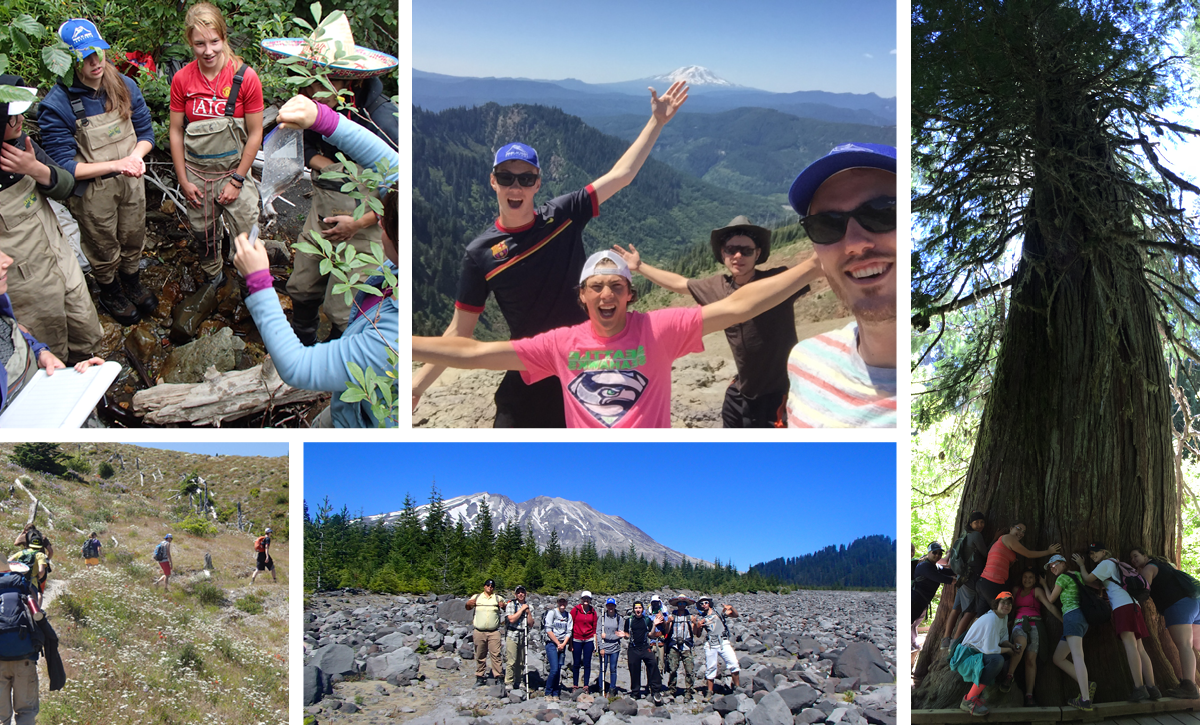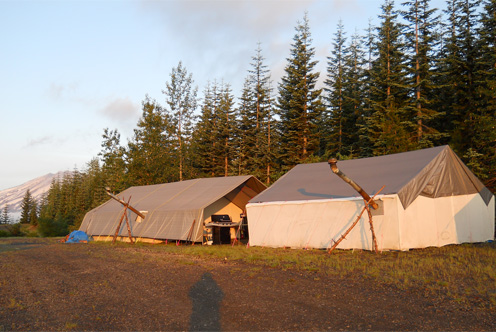Like many organizations and businesses, we've had to adapt quickly and make tough decisions. After extensive deliberations, the COVID-19 pandemic has forced us to cancel many of our 2020 and 2021 summer programs. You can read more about our response to the COVID-19 pandemic here.
We are offering day programs for families called Private Family Adventures but not overnight summer camps for youth in the summer of 2021. For more information and to keep up to date with our programs, consider joining our mailing list.
Summer Ecology Program is a multi-day field-based camp which exposes participants to research taking place today in the landscape affected by the 1980 eruption of Mount St. Helens. We work with professional scientists from the U.S. Forest Service, regional universities and non-profit organizations. This program is designed to introduce high school students to field-based STEM careers. This is a unique experience unlike any other summer camp!

WHO |
Summer Ecology Program is an overnight field-based camp for youth age 15 - 18 years old interested in natural resources, ecology, biology and/or geology. Participants travel from around the United States for the opportunity to meet and practice real science. This program is designed to introduce high school students to field-based STEM careers.
Max number of youth: 12 Staff are trained educators who are passionate about volcanoes and ecology. All staff undergo background checks and have at minimum first aid and CPR training. Scientists are experts from the US Forest Service, environmental non-profits, and regional universities. |
WHAT |
What We Will Do: The landscape of Mount St. Helens affected by the 1980 eruption is one of the most active places of scientific research in the world. Our entire program takes place within the 1980 blast zone. We work with professional scientists from the U.S. Forest Service, regional universities and non-profit organizations on contemporary research projects at Mount St. Helens. Participants spend time hiking, exploring, collecting data, and team building. During Summer Ecology Program, participants will assist professional scientists with field-based projects. Past projects include nutrient cycling in Spirit Lake, huckleberry restoration, plant ecology, species interactions on the Pumice Plain, stream ecology, pollinators and more. Past researchers include scientists from the University of Washington Tacoma, Cascade Forest Conservancy, Washington Department of Fish and Wildlife, Washington State University Vancouver, The Evergreen State College, and the U.S. Forest Service. CLICK HERE to read about the experiences of high school students in the 2019 Summer Ecology Program written by the high school participants themselves! Meals and Snacks: Meals and snacks are provided at camp. Our meals include many fresh fruits and vegetables. We accommodate for dietary needs as best as possible, though we cannot guarantee that our kitchen is allergen free. If you have severe allergies please contact learn@mshinstitute.org . What Skills are Necessary: No experience in ecology, hiking, or camping is necessary, but it is essential that participants are comfortable being outside and are curious about science. Needed Supplies: Field Ecologists will hike every day during the program – on the Pumice Plain, in the blowdown forest and at other research sites on the volcano. You will need sturdy shoes, a sleeping bag, a daypack/school backpack, sunscreen, a ball cap or sunhat, and 2 good water bottles. We have sleeping bags for loan. A full packing list and information packet will be provided upon registration. |
WHERE |
 The Mount St. Helens Institute Windy Ridge Field Camp is our basecamp for the duration of the Summer Ecology Program. This site is located on the eastern side of Mount St. Helens, on a ridge at an elevation of 4,000 feet, approximately 4 hours from Portland. Camp consists of canvas-walled tents with cots, an outdoor kitchen and a composting toilet. Our dining area has fantastic views of nearby Cascade volcanoes Mount Adams, Mount Rainier and Mount St. Helens. During this camp we will visit many locations in the Mount St. Helens Blast Zone. The Mount St. Helens Institute Windy Ridge Field Camp is our basecamp for the duration of the Summer Ecology Program. This site is located on the eastern side of Mount St. Helens, on a ridge at an elevation of 4,000 feet, approximately 4 hours from Portland. Camp consists of canvas-walled tents with cots, an outdoor kitchen and a composting toilet. Our dining area has fantastic views of nearby Cascade volcanoes Mount Adams, Mount Rainier and Mount St. Helens. During this camp we will visit many locations in the Mount St. Helens Blast Zone. |
WHEN |
Summer Ecology Program takes place in a remote location on the eastern side of Mount St. Helens. To accommodate this distance and the fact that participants fly from around the United States to participate in this camp, the Mount St. Helens Institute organizes a carpool to pickup participants along the I5 corridor between Portland, OR and Chehalis, WA. Details about this carpool will be provided upon registration. |
|
HOW |
Summer Ecology Program for 2021 is cancelled. Registration information for 2022 Summer Ecology Program will be available in the spring of 2022. A limited amount of need-based financial assistance for summer camps will be available. |
Activities and schedules are subject to change at the discretion of the Mount St. Helens Institute staff based on weather, resources and group energy. Our staff will be with the program at all times.
Day 1 (Sunday): Meet at pick-up locations and drive to the Mount St. Helens Institute’s Field Camp. We will discuss the program schedule, become oriented to camp life and get to know one another. We will learn about the 1980 eruption of Mount St. Helens and the basics of ecology during an evening excursion to Windy Ridge.
Day 2 (Monday): For the first part of the day, we will head to the field to participate in research projects led by guest scientists. We may work on projects in small groups or together as one large group. In the late afternoon we will visit a creek/shallow lake to cool down and return to camp. Back at camp we will have dinner, debrief the day’s research and do an evening activity such as a night hike or wildlife tracking.
Day 3 (Tuesday): We will once again break into groups to work with field research teams. In the afternoon teams will meet back up at camp for dinner. We will debrief the activities of the day and participate in an informal career panel with guest researchers who stay at neighboring camps.
Day 4 (Wednesday): We again will head to the field to participate in research projects led by guest scientists. These may be similar or different projects from the previous day. In the late afternoon we will visit a creek/shallow lake to cool down and return to camp for dinner. During the evening, we will again debrief the day’s activities and celebrate our last day in the field!
Day 5 (Thursday): Our final day will include time in the morning to work on independent projects. Together we will pack up our camp and begin our journey from the mountain. On the way we will stop at a few unique spots in the unique landscape of Mount St. Helens before meeting parents and guardians for the end of camp.
Each day will include breaks for meals, free and rest time, games and activities.